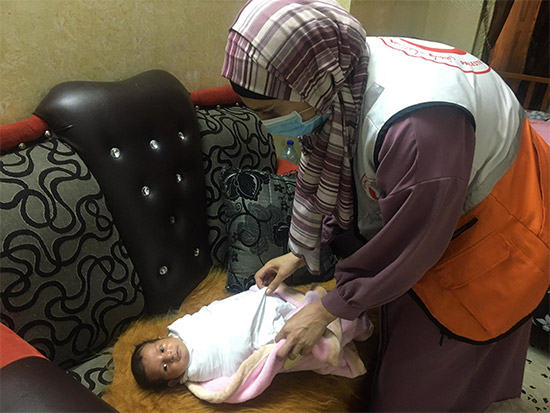 5 May 0201 - 33-year-old Amani is a mother of three and nurse who works with a mobile clinic team of the Palestine Red Crescent Society (PRCS). She has been working with the team for the past four years, providing primary care services to underserved and remote Palestinian communities in Area C, which comprises approximately 60% of the West Bank that remains under Israeli civil and military control. The area has been the focus of Israeli settlement expansion, with accompanying severe restrictions on Palestinian development of infrastructure. Restrictions affect the development of permanent or semi-permanent health facilities, placing dependence on mobile clinic teams for provision of essential health services. However, access can be unpredictable and precarious, a situation that has been exacerbated during the COVID-19 pandemic.
5 May 0201 - 33-year-old Amani is a mother of three and nurse who works with a mobile clinic team of the Palestine Red Crescent Society (PRCS). She has been working with the team for the past four years, providing primary care services to underserved and remote Palestinian communities in Area C, which comprises approximately 60% of the West Bank that remains under Israeli civil and military control. The area has been the focus of Israeli settlement expansion, with accompanying severe restrictions on Palestinian development of infrastructure. Restrictions affect the development of permanent or semi-permanent health facilities, placing dependence on mobile clinic teams for provision of essential health services. However, access can be unpredictable and precarious, a situation that has been exacerbated during the COVID-19 pandemic.
One of the communities served by the PRCS mobile clinic that Amani works for is Az-Zubaidat village in the Jericho governorate of the central Jordan Valley. The community experienced an outbreak of COVID-19 in September 2020, but the clinic continued to provide its essential services.
Amani stated, “It’s true we were extremely scared, but our fear didn’t prevent us from providing our service to the fullest extent. People in the community were very thankful to us for the effort. They felt they were not alone during this time, and we were the only organisation in the area able to maintain our services. To this day we have continued. The weather in September was really hot. After the visit when we would take off the protective gear and all our clothes would be wet. Still we were happy we provided the service.”
The clinic provides screening services, medical consultations, women’s health services, and women’s education and empowerment activities. Amani is also involved in home visits to women who have just given birth, to carry out check-ups on mother and baby. During COVID-19, the clinic provided additional services including health promotion and awareness, provision of hygiene kits, and COVID-19 screening services. The team would answer the questions of community member and explain to them the symptoms of COVID-19 and where to seek assistance or medical help.
A difficulty of health care provision during this period has been the stigma towards health care workers, including comments Amani endured from other colleagues and family members for continuing to visit affected areas. “When other colleagues would come to the mobile clinic office, they would automatically wear their mask before coming close to us. They kept telling us to be careful as they were worried. Distant family also commented about my work as they were scared I would bring the virus home.”
With restrictions of movement and closure of schools many working mothers were asked to take days off to be able to spend time with their children. Amani wasn’t able to take a single day of annual leave during 2020 and spent all her time providing support to families served by the clinic. While she was at work, Amani’s family, including her aunts and grandparents, helped with childcare.
“People know about the Palestine Red Crescent Society and the services we provide. We didn’t stop visiting our communities for a single day. When you provide a service and see people’s appreciation for your work, you realize it is important and you forget your fears. You want to help more. I knew that these people needed our help, and we were the only organisation able to visit them during that time.”




